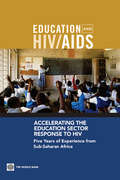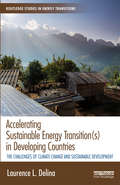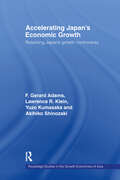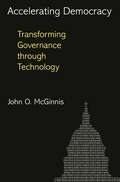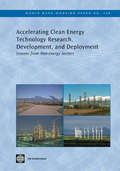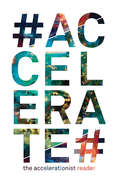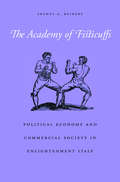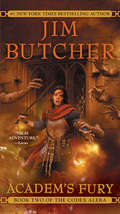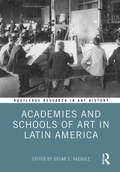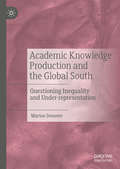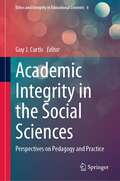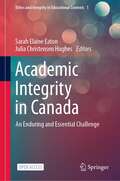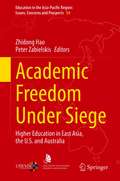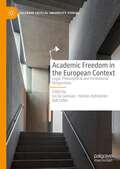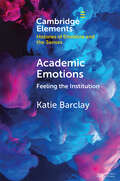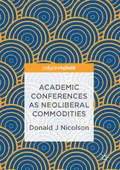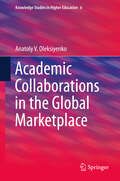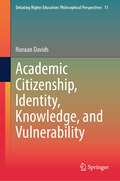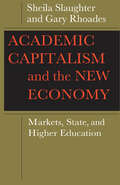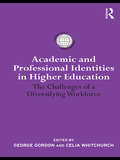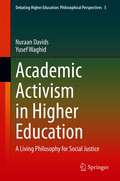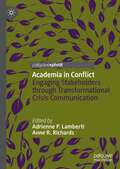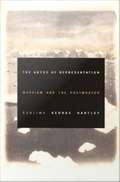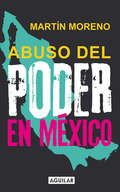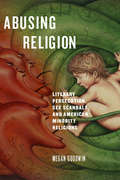- Table View
- List View
Accelerating the Education Sector Response to HIV
by Donald Bundy Anthi Patrikios Lesley Drake Changu Mannathoko Stella Manda Bachir Sarr Andy TembonThe education sector plays a key "external" role in preventing and reducing the stigma surrounding HIV/AIDS. It also plays an important "internal" role in providing access to care, treatment, and support for teachers and education staff, a group that in many countries represents more than 60 percent of the public sector workforce. The education sector can also have a critically important positive effect on the future: Even in the worst-affected countries, most schoolchildren are not infected. For these children, there is a chance to live lives free from AIDS if they can be educated on the knowledge and values that can protect them as they grow up. The authors of 'Accelerating the Education Sector Response to HIV' explore the experiences of education sectors across Sub-Saharan Africa as they scale up their responses to HIV/AIDS within the Accelerate Initiative Working Group, established in 2002 by the Joint United Nations Programme on HIV/AIDS (UNAIDS) Inter-Agency Task Team on Education. This book demonstrates that leadership by the ministries of education and commitment from key development partners are crucial for mobilizing activities and that full participation of all stakeholders is required for effective implementation. This book summarizes the experiences of technical Focal Points from the 37 ministries of education in Sub-Saharan Africa, which are represented on the sub-regional networks for HIV and Education. These experiences prove that the education sector response can play a crucially important role in the multisectoral national responses to this epidemic.
Accelerating Sustainable Energy Transition: The challenges of climate change and sustainable development (Routledge Studies in Energy Transitions)
by Laurence L DelinaAccelerating sustainable energy transitions away from carbon-based fuel sources needs to be high on the agendas of developing countries. It is key in achieving their climate mitigation promises and sustainable energy development objectives. To bring about rapid transitions, simultaneous turns are imperative in hardware deployment, policy improvements, financing innovation, and institutional strengthening. These systematic turns, however, incur tensions when considering the multiple options available and the disruptions of entrenched power across pockets of transition innovations. These heterogeneous contradictions and their trade-offs, and uncertainties and risks have to be systematically recognized, understood, and weighed when making decisions. This book explores how the transitions occur in fourteen developing countries and broadly surveys their technological, policy, financing, and institutional capacities in response to the three key aspects of energy transitions: achieving universal energy access, harvesting energy efficiency, and deploying renewable energy. The book shows how fragmented these approaches are, how they occur across multiple levels of governance, and how policy, financing, and institutional turns could occur in these complex settings. This book will be of interest to students and scholars of energy and climate policy, development studies, international relations, politics, strategic studies, and geography. It is also useful to policymakers and development practitioners.
Accelerating Japan's Economic Growth: Resolving Japan's Growth Controversy (Routledge Studies in the Growth Economies of Asia)
by Lawrence R. Klein F. Gerard Adams Kumasaka Yuzo Shinozaki AkihikoThe Japanese economy is beginning to show signs of recovery after years of stagnation/deflation, but many Japanese policymakers warn that this economic growth may be sluggish: slower than in the United States and certainly slower than in other East Asian countries. Japan faces significant economic problems, including an aging population, a large fiscal deficit, and the need to adjust to the IT economy and to competition with the rest of East Asia. A slow growth scenario would greatly reduce opportunities for new productive investment and would make it increasingly difficult to provide for Japan's growing social needs. The authors of this book argue that Japan can and should grow more rapidly, and examine the reasons for the sluggish performance of the Japanese economy. For example, some Japanese economic sectors, particularly in distribution and finance, have failed to take advantage of new information and communications technology to accelerate the growth of productivity, as has happened in other countries, such as the US. Production function studies and econometric model simulations suggest that with appropriate policies the Japanese economy can grow more rapidly and deal with its future problems. The book posits a number of policy proposals which would help to accelerate Japan's economic growth This book will be of interest to students of the Japanese economy, macroeconomics and international economies, and also to policymakers and professionals interested in Japan’s economy.
Accelerating Democracy: Transforming Governance Through Technology
by John O. McGinnisHow to adapt democracy to the accelerating pace of technological change—and why it's critical that we doSuccessful democracies throughout history—from ancient Athens to Britain on the cusp of the industrial age—have used the technology of their time to gather information for better governance. Our challenge is no different today, but it is more urgent because the accelerating pace of technological change creates potentially enormous dangers as well as benefits. Accelerating Democracy shows how to adapt democracy to new information technologies that can enhance political decision making and enable us to navigate the social rapids ahead.John O. McGinnis demonstrates how these new technologies combine to address a problem as old as democracy itself--how to help citizens better evaluate the consequences of their political choices. As society became more complex in the nineteenth century, social planning became a top-down enterprise delegated to experts and bureaucrats. Today, technology increasingly permits information to bubble up from below and filter through more dispersed and competitive sources. McGinnis explains how to use fast-evolving information technologies to more effectively analyze past public policy, bring unprecedented intensity of scrutiny to current policy proposals, and more accurately predict the results of future policy. But he argues that we can do so only if government keeps pace with technological change. For instance, it must revive federalism to permit different jurisdictions to test different policies so that their results can be evaluated, and it must legalize information markets to permit people to bet on what the consequences of a policy will be even before that policy is implemented.Accelerating Democracy reveals how we can achieve a democracy that is informed by expertise and social-scientific knowledge while shedding the arrogance and insularity of a technocracy.
Accelerating Clean Energy Technology Research, Development, and Deployment
by Jonathan Coony Patrick AvatoClimate change is one of the key challenges of this century. At the same time, energy use-the primary source of climate-altering global greenhouse gas emissions-is increasing at unprecedented rates and is vital to the continued economic growth of developing countries. This poses a serious dilemma that can only be reconciled with new and improved clean energy technologies that balance climate change mitigation and increased energy needs in developing countries. Despite a recent increase in investment, public and private research, development, and deployment (RD&D) funding rates are well below historical levels. In addition, significant barriers impede the ability to develop new technologies, such as the uncertain future value of CO2 emissions, intellectual property rights issues, limited incentives to commercialize technologies for developing countries, and challenges with technology transfer. These factors must be overcome to accelerate innovation in the energy sector. To introduce new thinking to address these concerns, this report examines four cases from outside the energy sector where creative approaches to RD&D have successfully overcome similar barriers. The case studies review approaches to innovation by the Consultative Group on International Agricultural Research, Advanced Market Commitments for Vaccines, the Human Genome Project, and the concept of Distributed Innovation. These case studies show how creative efforts can generate valuable public goods via: (i) international partnerships between public and private actors, (ii) information sharing and intellectual property rights, and (iii) novel financing schemes.
#Accelerate: The Accelerationist Reader
by Robin Mackay Armen AvanessianAn apparently contradictory yet radically urgent collection of texts tracing the genealogy of a controversial current in contemporary philosophy.Accelerationism is the name of a contemporary political heresy: the insistence that the only radical political response to capitalism is not to protest, disrupt, critique, or détourne it, but to accelerate and exacerbate its uprooting, alienating, decoding, abstractive tendencies.#Accelerate presents a genealogy of accelerationism, tracking the impulse through 90s UK darkside cyberculture and the theory-fictions of Nick Land, Sadie Plant, Iain Grant, and CCRU, across the cultural underground of the 80s (rave, acid house, SF cinema) and back to its sources in delirious post-68 ferment, in texts whose searing nihilistic jouissance would later be disavowed by their authors and the marxist and academic establishment alike.On either side of this central sequence, the book includes texts by Marx that call attention to his own “Prometheanism,” and key works from recent years document the recent extraordinary emergence of new accelerationisms steeled against the onslaughts of neoliberal capitalist realism, and retooled for the twenty-first century.At the forefront of the energetic contemporary debate around this disputed, problematic term, #Accelerate activates a historical conversation about futurality, technology, politics, enjoyment, and capital. This is a legacy shot through with contradictions, yet urgently galvanized today by the poverty of “reasonable” contemporary political alternatives.
The Academy of Fisticuffs: Political Economy and Commercial Society in Enlightenment Italy
by Sophus A. ReinertThe Italian Enlightenment, no less than the Scottish, was central to the emergence of political economy and creation of market societies. Sophus Reinert turns to Milan in the late 1700s to recover early socialists’ preoccupations with the often lethal tension among states, markets, and human welfare, and the policies these ideas informed.
Academ's Fury (Codex Alera #2)
by Jim ButcherIn Furies of Calderon, #1 New York Times bestselling author Jim Butcher introduced readers to a world where the forces of nature take physical form. But now, it is human nature that threatens to throw the realm into chaos. <P>For centuries, the people of Alera have harnessed the furies—elementals of earth, air, fire, water, wood, and metal—to protect their land from aggressors. But no fury can save them from the dangers they face within. A mysterious attack from across the sea has weakened the First Lord. Should he fall, a bloody civil war is inevitable. The responsibility of fending off assassination attempts and treachery within the First Lord’s circle of spies falls on Tavi, the one man with no fury to call.
Academies and Schools of Art in Latin America (Routledge Research in Art History)
by Oscar E. VázquezThis edited volume’s chief aim is to bring together, in an English-language source, the principal histories and narratives of some of the most significant academies and national schools of art in South America, Mexico, and the Caribbean, from the late 18th to the early 20th centuries. The book highlights not only issues shared by Latin American academies of art but also those that differentiate them from their European counterparts. Authors examine issues including statutes, the influence of workshops and guilds, the importance of patronage, discourses of race and ethnicity in visual pedagogy, and European models versus the quest for national schools. It also offers first-time English translations of many foundational documents from several significant academies and schools. This book will be of interest to scholars in art history, Latin American and Hispanic studies, and modern visual cultures.
Academic Knowledge Production and the Global South: Questioning Inequality and Under-representation
by Márton DemeterThis book investigates and critically interprets the underrepresentation of the global South in global knowledge production. The author analyses the serious bias towards scholars and institutions from this region: he argues that this phenomenon causes serious disadvantages not only for authors and institutions, but global science as well by impeding the flow of fresh, innovative scholarship. This book uses a combination of field theory and world-systems analysis to explain the motives and dynamics behind the geopolitical and societal inequalities in the system of global knowledge production. Subsequently, the author offers several solutions by which these inequalities could be reduced, or even eliminated. This book will be of interest and value to scholars of knowledge inequalities, and knowledge production in the global South.“Márton Demeter’s monograph invokes rich anecdotal, empirical and scientometric evidence to delineate the contours of a world system that preserves the dominance of Western knowledge and scholars and the westernisation or peripheralisation of the rest – a system defined by geopolitical and material inequalities, socio-economic class differences, institutional elitism and publishing biases. Demeter’s work counters narratives that present academia as meritocratic and that justify disparities in world publications on the basis of pure rigour, exposing rather norms and values that perpetuate a western elitist system and peripheralise those who happen to lack this cultural capital. Demeter’s work adds to an expanding field of research documenting how Anglophone standards and biases in journal indexing, peer review and editorial board recruitment marginalise consistently the Global South. His practical and concrete suggestions to subvert this system of horizontal and vertical inequalities could not be timelier and provides momentum to decolonisation movements in higher education across the world.” —Dr Romina Istratii, SOAS University of London, UK“Márton Demeter is a scholar dedicated to revealing the inequality in academic publishing and a strong advocate for scholars from the Global South. This book is an epitome of his effort on this cause. Demeter utilizes his wealth of data including authorships, citations, journal publishers, editorial review board compositions, the reviewers and the editors of journals as strong evidence of inequality with his three-dimensional model of academic stratification. This book is a must-read for scholars both in the Global North and the Global South to reflect on the current state of academic knowledge gatekeeping and production. It will spark a dialogue between scholars to address the dominance of the Global North especially in the field of communication.”—Professor Louisa Ha, Bowling Green State University, USA “Márton Demeter’s analysis and critique of the unequal structure of global knowledge production is a powerful contribution to the global justice movement with dramatic implications for what academics in both the Global North and the Global South can do to help science and the humanities live up to their claims of meritocracy and universality. Demeter employs a useful critical combination of the world-systems perspective and Bourdieusian field theory to organize the results of his careful and sophisticated empirical studies of global knowledge production. He is an intrepid protagonist of a more egalitarian human future.”—Professor Christopher Chase-Dunn, University of California, Riverside, USA
Academic Integrity in the Social Sciences: Perspectives on Pedagogy and Practice (Ethics and Integrity in Educational Contexts #6)
by Guy J. CurtisThis international book provides a series of viewpoints on academic integrity from the perspective of social sciences. It brings together multiple aspects of academic integrity, but with the consistent theme of being at a level of analysis that considers people and their place in the world. It covers topics such as how academic integrity can be taught, and why academic integrity breaches occur. This book informs the work of researchers, educators, and practitioners as we go forward in understanding academic integrity and addressing academic misconduct. The social sciences include academic disciplines such as sociology, economics, psychology, education, anthropology, political science, and criminology. Researchers and theorists in these fields offer a range of unique and valuable perspectives on academic integrity with questions ranging from: “Why do students cheat and how best do we teach them not to?” to “What are the societal and political implications of academic cheating?”
Academic Integrity in Canada: An Enduring and Essential Challenge (Ethics and Integrity in Educational Contexts #1)
by Sarah Elaine Eaton Julia Christensen HughesThis open access book presents original contributions and thought leadership on academic integrity from a variety of Canadian scholars. It showcases how our understanding and support for academic integrity have progressed, while pointing out areas urgently requiring more attention.Firmly grounded in the scholarly literature globally, it engages with the experience of local practicioners. It presents aspects of academic integrity that is specific to Canada, such as the existence of an "honour culture", rather than relying on an "honour code". It also includes Indigenous voices and perspectives that challenge traditional understandings of intellectual property, as well as new understandings that have arisen as a consequence of Covid-19 and the significant shift to online and remote learning.This book will be of interest to senior university and college administrators who are interested in ensuring the integrity of their institutions. It will also be of interest to those implementing university and college policy, as well as those who support students in their scholarly work.
Academic Freedom Under Siege: Higher Education in East Asia, the U.S. and Australia (Education in the Asia-Pacific Region: Issues, Concerns and Prospects #54)
by Zhidong Hao Peter ZabielskisThis book argues that academic freedom in higher education in East Asia, the U.S. and Australia is under stress. Academic freedom means freedom to teach, research, and serve in multiple political and social roles based on professional principles. It is closely linked to shared governance, in which academics participate in and influence decision making in core academic concerns such as choosing new faculty, faculty promotion, tenure decisions and the approval of new academic programs.In different countries and regions, the duress confronting academic freedom may come from different directions, and the ability of faculty to share power can vary greatly. In authoritarian mainland China, it is mostly political and ideological controls that greatly affect academic freedom, and shared governance is very much limited. In semi-democracies like Hong Kong and Macau and democracies like Taiwan, Japan, South Korea, the U.S. and Australia, corporatization and commercialization have had great impact on both academic freedom and shared governance. The result is that the roles professors play within academia are continually being diminished and the academic profession is struggling to maintain its ground. Similar developments are also occurring in Europe. These developments should cause great concern to educators, researchers and policymakers everywhere. The authors collected here present attempts to learn from current practice in order to move policy into directions that will help protect higher education as a common good. This book highlights the importance of academic freedom and provides insights into the ways it is being infringed both by commercialization and corporatization on the one hand and political repression on the other. It vividly illustrates detailed case studies and empirical data that make it a compelling read.- Professor Ruth Hayhoe, University of Toronto, Canada Academic freedom is as important today as at any time in the last century. The authors point out the challenges that academic freedom faces on a global scale. The import of the book is in its comparative perspective steeped in data and analysis. Thoughtful. Cogent. Compelling. - Professor William G. Tierney and Professor Wilbur-Kieffer, University of Southern California, United States
Academic Freedom in the European Context: Legal, Philosophical and Institutional Perspectives (Palgrave Critical University Studies)
by Ralf Lüfter Ivo De Gennaro Hannes HofmeisterThis book explores the concept of academic freedom from a European vantage point. Drawing on both philosophical and legal perspectives, the editors and contributors analyse the concept of academic freedom within the present institutional setting. Academic freedom has long been considered a natural part of higher education, but as the world enters the digital age, a renewed understanding of its role and the threats it must face is required. The authors question the purpose of science without freedom, and subsequently the purpose of political communities without free science. Although the book uses European case studies to answer these questions, it undoubtedly has global relevance: what would be left of the present notion of the ‘global world’ were we to conceive of its character without modern science? This book calls for a critical re-examination of the academic community and its own understanding of the sources, conditions and aims of scientific practice.
Academic Emotions: Feeling the Institution (Elements in Histories of Emotions and the Senses)
by Katie BarclayThe University is an institution that disciplines the academic self. As such it produces both a particular emotional culture and, at times, the emotional suffering of those who find such disciplinary practices discomforting. Drawing on a rich array of writing about the modern academy by contemporary academics, this Element explores the emotional dynamics of the academy as a disciplining institution, the production of the academic self, and the role of emotion in negotiating power in the ivory tower. Using methodologies from the History of Emotion, it seeks to further our understanding of the relationship between the institution, emotion and the self.
Academic Conferences as Neoliberal Commodities
by Donald J NicolsonThis book empirically examines academic conferences in the social sciences, and explores the purpose and value of people interested in the social sciences attending and presenting at national and international academic conferences. Using a highly original structure and style, the book considers the damaging impact of neoliberalism on conferences, and academia more widely, and explores the numerous barriers to conference attendance. It will be of interest to students and researchers who attend conferences in fields spanning the social sciences, as well as those interested in the effects of neoliberalism on academia.
Academic Collaborations in the Global Marketplace (Knowledge Studies in Higher Education #6)
by Anatoly V. OleksiyenkoThis book explains why conflict between the institutional and human agencies is an unavoidable outcome of competing local, national and global agendas at a major research university. It illustrates this by means of a case-study of Glonacal U, a university which belongs to the category of exceptional institutions that excel due to an established organizational culture of academic freedom, research excellence, shared governance, and intellectual leadership. The book shows how such a university may succumb to anxiety when neoliberal managers seek to exploit stakeholder doubts about university sufficiency, relevance, and performance in national and global markets and hierarchies of knowledge products and status goods. As top-down pressure for strategic choices in scientific partnerships increases at the world-class university, grassroots resistance to centralization increases also in order to remind the research university leaders that intellectual work and academic freedom are interdependent and central to building capacities for impactful global science. Productive global linkages are prerogative of academics who take full responsibility for success of project implementation and outcomes in scholarship and practice.
Academic Citizenship, Identity, Knowledge, and Vulnerability (Debating Higher Education: Philosophical Perspectives #11)
by Nuraan DavidsThis book brings into contestation the idea of academic citizenship as a homogenous and inclusive space. It delves into who academics are and how they come to embody their academic citizenship, if at all. Even when academics hold similar professional standings, their citizenship and implied notions of participation, inclusion, recognition, and belonging are largely pre-determined by their personal identity markers, rather than what they do professionally. As such, it is hard to ignore not only the contested and vulnerable terrain of academic citizenship, but the necessity of unpacking the agonistic space of the university which both sustains and benefits from these contestations and vulnerabilities.The book is influenced by a postcolonial vantage point, interested in unblocking and opening spaces, thoughts, and voices not only of reimagined embodiments and expressions of academic citizenship but of hitherto silenced and discounted forms of knowledge and being. It draws on academics' stories at various universities located in South Africa, USA, UK, Hong Kong, and the Philippines. It steps into the unexplored constructions of how knowledge is used in the deployment of valuing some forms of academic citizenship, while devaluing others. The book argues that different kinds of knowledge are necessary for both the building and questioning of theory: the more expansive our immersion into knowledge, the greater the capacities and opportunities for unlearning and relearning.
Academic Capitalism and the New Economy: Markets, State, and Higher Education
by Sheila Slaughter Gary RhoadesAs colleges and universities become more entrepreneurial in a post-industrial economy, they focus on knowledge less as a public good than as a commodity to be capitalized on in profit-oriented activities. In Academic Capitalism and the New Economy, higher education scholars Sheila Slaughter and Gary Rhoades detail the aggressive engagement of U.S. higher education institutions in the knowledge-based economy and analyze the efforts of colleges and universities to develop, market, and sell research products, educational services, and consumer goods in the private marketplace. Slaughter and Rhoades track changes in policy and practice, revealing new social networks and circuits of knowledge creation and dissemination, as well as new organizational structures and expanded managerial capacity to link higher education institutions and markets. They depict an ascendant academic capitalist knowledge/learning regime expressed in faculty work, departmental activity, and administrative behavior. Clarifying the regime's internal contradictions, they note the public subsidies embedded in new revenue streams and the shift in emphasis from serving student customers to leveraging resources from them.Defining the terms of academic capitalism in the new economy, this groundbreaking study offers essential insights into the trajectory of American higher education.
Academic and Professional Identities in Higher Education: The Challenges of a Diversifying Workforce (International Studies in Higher Education)
by Celia Whitchurch George GordonThe latest volume in the Routledge International Studies in Higher Education Series, Academic and Professional Identities in Higher Education: The Challenges of a Diversifying Workforce, reviews the implications of new forms of academic and professional identity, which have emerged largely as a result of a broadening disciplinary base and increasing permeability between higher education and external environments. The volume addresses the challenges faced by those responsible for the wellbeing of academic faculty and professional staff. International perspectives examine current practice against a background of rapidly changing policy contexts, focusing on the critical ‘people dimension’ of enhancing academic and professional activity, while also addressing national, socio-economic, and community agendas. Consideration is given to mainstream academic faculty and professional staff, researchers, library and information professionals, people with an interest in teaching and learning, and those involved in individual projects or institutional development. The following provide the key themes of Academic and Professional Identities in Higher Education: The Challenges of a Diversifying Workforce: The implications of diversifying academic and professional identities for the functioning of higher education institutions and sectors. The pace and nature of such change in different institutional systems and environments. The challenges to institutional systems and structures from emergent identities and possible tensions, and how these might be addressed. The implications of blurring academic and professional identities, with a shift towards mixed or ‘blended’ roles, for individual careers and institutional development.
Academic Activism in Higher Education: A Living Philosophy for Social Justice (Debating Higher Education: Philosophical Perspectives #5)
by Nuraan Davids Yusef WaghidThis book argues for renewed understandings of academic activism, understandings that conceive of the ideas, arguments and scholarship of the academe as embedded within the practices of what the academy does. It examines why and how a renewed notion of academic activism informs a philosophy of higher education specifically in relation to teaching and learning. The book focuses on the theories and practices of teaching and learning, in particular how such pedagogical actions are guided by social, political and cultural influences outside of the university as a higher education institution. The authors advocate for a living philosophy of higher education that is commensurate with real actions and imaginary fictions of what constitutes higher education and what remains in becoming for the discourse. With a focus on South African social justice education, the book imagines pathways for academic activism to manifest in revolutionised pedagogical actions or actions that bring into contestation what already exists with the possibility for the cultivation of renewal.
Academia in Conflict: Engaging Stakeholders through Transformational Crisis Communication
by Adrienne P. Lamberti Anne R. RichardsThis book explores communication as a key influence on the trajectory of conflicts and crises in the specific context of academia. From the ideological responsibilities of academia to the profit-seeking motives of institutions, the authors explore challenges facing faculty across multiple disciplines. Critique of the higher education industry is more necessary than ever in the context of academic corporatization and marketization. Academia in Conflict reveals how institutional discourses can contribute to or mitigate conflict and crisis, offering communication practices that prioritize stakeholder experiences and needs. Enduring academic crises are addressed, including declines in public funding, mental health emergencies, and threats to job stability. Academia in Conflict provides crucial insights for navigating the challenges of higher education today.
The Abyss of Representation: Marxism and the Postmodern Sublime
by George HartleyFrom the Copernican revolution of Immanuel Kant to the cognitive mapping of Fredric Jameson to the postcolonial politics of Gayatri Chakravorty Spivak, representation has been posed as both indispensable and impossible. In his pathbreaking work, The Abyss of Representation, George Hartley traces the development of this impossible necessity from its German Idealist roots through Marxist theories of postmodernism, arguing that in this period of skepticism and globalization we are still grappling with issues brought forth during the age of romanticism and revolution. Hartley shows how the modern problem of representation--the inability of a figure to do justice to its object--still haunts today's postmodern philosophy and politics. He reveals the ways the sublime abyss that opened up in Idealist epistemology and aesthetics resurfaces in recent theories of ideology and subjectivity. Hartley describes how modern theory from Kant through Lacan attempts to come to terms with the sublime limits of representation and how ideas developed with the Marxist tradition--such as Marx's theory of value, Althusser's theory of structural causality, or Zizek's theory of ideological enjoyment--can be seen as variants of the sublime object. Representation, he argues, is ultimately a political problem. Whether that problem be a Marxist representation of global capitalism, a deconstructive representation of subaltern women, or a Chicano self-representation opposing Anglo-American images of Mexican Americans, it is only through this grappling with the negative, Hartley explains, that a Marxist theory of postmodernism can begin to address the challenges of global capitalism and resurgent imperialism.
Abuso del poder en México
by Martín MorenoAbuso del poder en México es una denuncia frontal a los actos vergonzantes de políticos y legisladores, líderes sindicales y empresarios televisivos, cómplices indolentes del deterioro de nuestro país en materia política, social y económica. Del autor de Demonios del sindicalismo en México, Martín Moreno. Abuso del poder en México aspira a despertar el ánimo de los ciudadanos para decir basta ante el delito, la injusticia y la desigualdad. ¿Cómo gobierna el presidente Calderón? ¿Por qué estalló la guerra entre los cárteles de la droga? ¿Cómo operan los priistas? ¿Por qué el DF está enfermo? ¿Qué hay detrás del conflicto entre el Gobierno y el Sindicato Mexicano de Electricistas? ¿Por qué nadie se atreve a enfrentar a Elba Esther Gordillo, al frente del Sindicato Nacional de Trabajadores de la Educación? ¿Cuál fue la ruta del dinero sustraído por Napoleón Gómez Urrutia, hoy impune en el extranjero? ¿Quién ordena la fabricación de culpables durante las investigaciones en los delitos de secuestro o intento de homicidio? Abuso del poder en México está sustentado por la investigación profunda y severa de Martín Moreno, quien retrata los sucesos más oscuros que marcaron el sexenio de Felipe Calderón, la ineptitud e indiferencia de funcionarios ante la tragedia de miles de mexicanos y la voracidad de políticos, narcos e inversionistas cuestionables que dictan sus propias leyes y marcan su territorio con violencia y sangre. El compromiso de Martín Moreno con la verdad, con la sociedad y con su país, lo llevan a denunciar los actos más deplorables de quienes ejercen el poder en México, sus prácticas de abuso, intolerancia, imparcialidad y soberbia.
Abusing Religion: Literary Persecution, Sex Scandals, and American Minority Religions
by Megan GoodwinSex abuse happens in all communities, but American minority religions often face disproportionate allegations of sexual abuse. Why, in a country that consistently fails to acknowledge—much less address—the sexual abuse of women and children, do American religious outsiders so often face allegations of sexual misconduct? Why does the American public presume to know “what’s really going on” in minority religious communities? Why are sex abuse allegations such an effective way to discredit people on America’s religious margins? What makes Americans so willing, so eager to identify religion as the cause of sex abuse? Abusing Religion argues that sex abuse in minority religious communities is an American problem, not (merely) a religious one.
